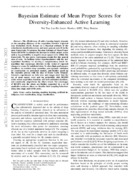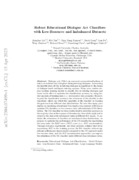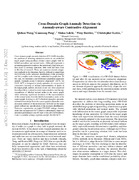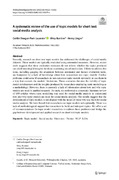Wray Buntine, PhD.
Browse by
Prior to his current appointment at VinUniversity, Wray Buntine was a full professor, foundation director of the Master of Data Science, and director of the Machine Learning Group at Monash University. Previously, he was conducting research projects at Helsinki Institute for Information Technology, NASA Ames Research Center, University of California, Berkeley, and Google. In the ’90s he was involved in a number of startups for both Silicon Valley and Wall Street. Professor Wray is known for his theoretical and applied work and in probabilistic methods for document and text analysis, social networks, data mining and machine learning. More recently he has been heavily involved in medical informatics. He will be general chair for Asian Conference on Machine Learning in Hanoi 2024. He is also co-Editor-in-Chief for the new ACM Transactions on Probabilistic Machine Learning and on several other journal editorial boards, and has been a senior program committee member for premier conferences such as IJCAI, UAI, AAAI, EMNLP, ICLR, ACML and NeurIPS. He has 18 book chapters, 48 journal articles and 81 refereed conference papers, several software products and two patents, with over 13,000 citations and a Google h-index of 49.
Recent Submissions
-
Robust educational dialogue act classifiers with low-resource and imbalanced datasets
(2023-04-15)Dialogue acts (DAs) can represent conversational actions of tutors or students that take place during tutoring dialogues. Automating the identification of DAs in tutoring dialogues is significant to the design of dialogue-based ... -
A survey on out-of-distribution evaluation of neural NLP models
(2023-06-27)Adversarial robustness, domain generalization, and dataset biases are three active lines of research contributing to out-of-distribution (OOD) evaluation on neural NLP models. However, a comprehensive, integrated discussion ... -
Bayesian estimate of mean proper scores for diversity-enhanced active learning
(2023-12-15)The effectiveness of active learning largely depends on the sampling efficiency of the acquisition function. Expected Loss Reduction (ELR) focuses on a Bayesian estimate of the reduction in classification error, and more ... -
Understanding Hierarchical Processes
(2022-12)Hierarchical stochastic processes, such as the hierarchical Dirichlet process, hold an important position as a modelling tool in statistical machine learning, and are even used in deep neural networks. They allow, for ... -
A systematic review of the use of topic models for short text social media analysis
(2023-05-01)Recently, research on short text topic models has addressed the challenges of social media datasets. These models are typically evaluated using automated measures. However, recent work suggests that these evaluation measures ... -
Robust Educational Dialogue Act Classifiers with Low-Resource and Imbalanced Datasets
(2023-04-15)Dialogue acts (DAs) can represent conversational actions of tutors or students that take place during tutoring dialogues. Automating the identification of DAs in tutoring dialogues is significant to the design of dialogue-based ... -
On the effect of isotropy on VAE representations of text
(2022-05)Injecting desired geometric properties into text representations has attracted a lot of attention. A property that has been argued for, due to its better utilisation of representation space, is isotropy. In parallel, VAEs ... -
Hardness-guided domain adaptation to recognize biomedical named entities under low-resource scenarios
(2022)Domain adaptation is a promising approach to address data scarcity in low-resource scenarios. However, applying it to token-level tasks like biomedical Named Entity Recognition (bioNER) poses challenges due to the unique ... -
Does informativeness matter? Active learning for educational dialogue act classification
(2023-04-12)Dialogue Acts (DAs) can be used to explain what expert tutors do and what students know during the tutoring process. Most empirical studies adopt the random sampling method to obtain sentence samples for manual annotation ... -
Cross-domain graph anomaly detection via anomaly-aware contrastive alignment
(2022-12-02)Cross-domain graph anomaly detection (CD-GAD) describes the problem of detecting anomalous nodes in an unlabelled target graph using auxiliary, related source graphs with labelled anomalous and normal nodes. Although it ... -
AUC Maximization for Low-Resource Named Entity Recognition
(2023-04-13)Current work in named entity recognition (NER) uses either cross entropy (CE) or conditional random fields (CRF) as the objective/loss functions to optimize the underlying NER model. Both of these traditional objective ... -
A systematic review of the use of topic models for short text social media analysis
(2023-03-14)Recently, research on short text topic models has addressed the challenges of social media datasets. These models are typically evaluated using automated measures. However, recent work suggests that these evaluation measures ... -
Understanding Hierarchical Processes
(2022-11-22)Hierarchical stochastic processes, such as the hierarchical Dirichlet process, hold an important position as a modelling tool in statistical machine learning, and are even used in deep neural networks. They allow, for ...













